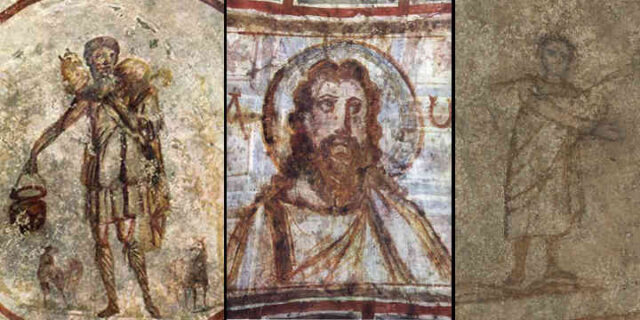A lot of things are written about Jesus, by believers, sceptics and everyone in between. But what do the expert historians say?
There is a difference between facts and belief. In this post I am examining what those who have studied the matter have concluded. It is likely more than most sceptics want to believe (after all we have a good deal of historical information about Jesus) and less than most christians want to believe (there is much in the Bible that cannot be sufficiently verified to be known to be historical).
But once we understand the facts, as best as they can be known, we then have a basis for forming beliefs about Jesus.
Facts and belief
Beliefs are simply what we each think – about all sorts of things. Generally, we base our beliefs, at least in part, on good evidence or facts. For example, I learn the fact that 99% of the world lives on less income than I do, so I think (believe) that I have a responsibility to alleviate poverty.
Or, I learn the scientists have concluded that the world is warming due to human use of fossil fuels, and that this will have disastrous consequences, so I think (believe) that I should vote for politicians who will do something to prevent this. Note that in this case the facts are not absolutely certain (in science they almost never are), but the expert scientists say they are highly probable – and only a minority of scientists disagree.
Facts and belief about Jesus
It is the same with Jesus. There are historical facts which most expert historians tell us are probable, with very few dissenting, and other evidence that they are not in such agreement about. And then there are opinions (beliefs) about Jesus – all of us have them, including historians, but we differ widely.
For more on facts and beliefs about Jesus, see Jesus: historical facts vs belief.
Facts about Jesus
Here is a summary of what historians regard as probable historic facts about Jesus. Some of these historians are christians, some are not, but they are not writing about their beliefs, just about the historical evidence.
Jesus existed
Almost without exception, expert historians believe a man named Jesus, recognisable as the one described in the gospels, lived and died in first century Palestine – see Was Jesus a real person? for some of the reasons why they believe this, and Quotes on Jesus as a historical person for quotes from some of the world’s most respected historians. For example, Bart Ehrman says: “I don’t think there’s any serious historian who doubts the existence of Jesus …. We have more evidence for Jesus than we have for almost anybody from his time period.”
Jesus’ life and death
Secular historians, whether christian or not, broadly agree on the basic facts of Jesus’ life (see Jesus in history). EP Sanders, one of the most respected NT scholars of the past 30 years, and cautiously sceptical, wrote in The Historical Figure of Jesus, p10-11:
I shall first offer a list of statements about Jesus that meet two standards: they are almost beyond dispute; and they belong to the framework of his life, and especially of his public career. (A list of everything that we know about Jesus would be appreciably longer.)
Jesus was born c 4 BCE near the time of the death of Herod the Great;
he spent his childhood and early adult years in Nazareth, a Galilean village;
he was baptised by John the Baptist;
he called disciples;
he taught in the towns, villages and countryside of Galilee (apparently not the cities);
he preached ‘the kingdom of God’;
about the year 30 he went to Jerusalem for Passover;
he created a disturbance in the Temple area;
he had a final meal with the disciples;
he was arrested and interrogated by Jewish authorities, specifically the high priest;
he was executed on the orders of the Roman prefect, Pontius Pilate.
Maurice Casey and Michael Grant add a few other items to Sanders’ cautious list:
- he preached repentance, forgiveness and the coming of the kingdom of God in rural and small-town Galilee;
- he was known in his day as a healer and exorcist (Casey says he was a folk healer);
- Jesus predicted his death and resurrection and he believed his death would be redemptive;
- Jesus’ tomb was really empty and/or his disciples “saw” him (in what sense is uncertain) after his death.
There are of course scholars who contest many or most of these items, but they are apparently in the minority, as most scholars I have read would endorse Sanders’ list at least.
Sanders concludes:
Historical reconstruction is never absolutely certain, and in the case of Jesus it is sometimes highly uncertain. Despite this, we have a good idea of the main lines of his ministry and his message. We know who he was, what he did, what he taught, and why he died. ….. the dominant view [among scholars] today seems to be that we can know pretty well what Jesus was out to accomplish, that we can know a lot about what he said, and that those two things make sense within the world of first-century Judaism.
Beliefs about Jesus
While most scholars believe Jesus was known as a miracle worker, not all believe he actually performed miracles. And while most scholars believe either Jesus’ tomb was found empty, or his disciples saw visions of him, or both, not all believe he was physically raised from death. While some scholars believe he was divine, others do not.
None of the scholars I have referenced here (Sanders, Casey, Grant, Ehrman) are, or were, christians; they are/were agnostics or atheists. Christian scholars I sometimes reference include NT Wright, Richard Bauckham and John Dickson.
My beliefs about Jesus
I believe Jesus was divine, that he was resurrected, and that he really performed miracles. These are my conclusions after considering the evidence referred to above. Obviously other people consider the same evidence and come to different conclusions (beliefs).
It isn’t my purpose here to present the case for why I believe these things about Jesus, but I base my belief on these things:
- Luke (especially) and the other gospel writers, including John, have been shown to be reasonably reliable reporters. Classical historians (i.e. ancient historians not specialising in NT history) generally accept the gospels as useful historical documents. It is reasonable to trust these biographies – see Are the gospels historical? and Archaeology and John’s gospel.
- Most scholars agree that Jesus did not make overt claims to divinity, and scholars are divided about whether he made any less overt claims. But I believe a number of passages, most of which would be regarded as authentic by most scholars, give enough of an indication that he did claim divinity – see Jesus – son of God?.
- I believe the evidence for the resurrection is best explained by it actually happening – see Was Jesus raised from the dead?.
When to quote the scholars
When I quote the scholars, it is to establish the probable historical facts, as outlined above. When I talk about my beliefs, I quote the scholars to establish the historical facts, not to justify my personal beliefs.
Graphic: Three very ancient depictions of Jesus (from left to right):
Jesus in the Catacombs of Rome. Third-century fresco from the Catacomb of Callixtus of Christ as the Good Shepherd (Wikimedia Commons, public domain).
Mural painting from the catacomb of Commodilla. One of the first bearded images of Jesus, late 4th century (Wikipedia, public domain).
The Healing of the Paralytic – one of the oldest known depictions of Jesus, from the Syrian city of Dura Europos, dating from about 235 (Wikipedia, public domain).





You are cherry picking history to suit your belief, there is no where in history that Herod tried to kill the baby jesus , and Herod would have been dead 10 years before the baby jesus would have been born. That is why there are two different stories about why Mary and Joseph was on the road, and none of them are historically true. If jesus was real, he wouldn’t have been called jesus, and m,os5t6 of the so called evidence that they claim is not evidence, most of the historians you list, always contradict themselves, and people ignore it, bart have said many things that contradict himself, there are times he says there is no evidence for the resurrection, then he changes his tune and claims there is, it depends on who is talking to, what you believe have no bearing on history, no one can prove jesus existed, if they did prove it, you wouldn’t no longer believe it, the fact there is a debate going on, it means no one has proven that jesus was real, no other historical figure who existed goes through these debate, because there is real evidence that support their existence, the same can be said for jesus. I dare you to show me evidence for jesus that is on the same level as Abraham Lincoln, Hitler or anyone historically.
Hi majicc66, thanks for commenting. I always appreciate comments even if I don’t agree with them.
Would you be interested in discussing this a little more? As a starter, I’d be interested to hear what you think is and isn’t historical evidence. Do you think we can know anything about any ancient figures? (For example, for which of these do you think there is sufficient historial evidence – Julius Caesar, Hannibal, Pontius Pilate, Paul of Tarsus?
Thanks.
Can you guys share other scholarly works accepted by non-believers for scholarly sources?
Hi xuong, a scholar’s reputation depends on the quality of their work and how it is recognised by their peers. So a scholar’s work should generally be accepted by non-believers and believers alike if they read widely, have good knowledge of the subject, make a reasoned case and don’t show obvious biases.
So I think the following authors and scholars are widely accepted: NT Wright, Richard Bauckham, Bart Ehrman, Paula Fredriksen, Geza Vermes, EP Sanders, Dale Allison, Gerd Thiessen, Maurice Casey, Amy-Jill Levine, Peter Enns, Craig Keener. There would be many, many others (my list is maybe a little old now), but those are ones that I have found helpful.